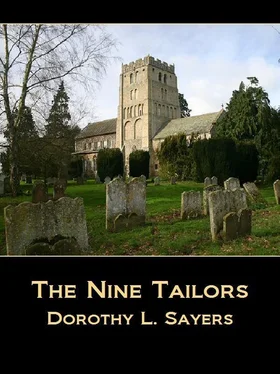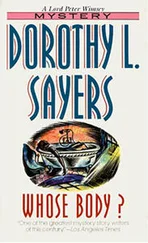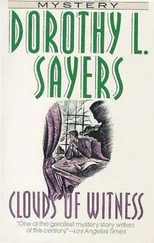Dorothy Sayers - The Nine Tailors
Здесь есть возможность читать онлайн «Dorothy Sayers - The Nine Tailors» весь текст электронной книги совершенно бесплатно (целиком полную версию без сокращений). В некоторых случаях можно слушать аудио, скачать через торрент в формате fb2 и присутствует краткое содержание. Жанр: Классический детектив, на английском языке. Описание произведения, (предисловие) а так же отзывы посетителей доступны на портале библиотеки ЛибКат.
- Название:The Nine Tailors
- Автор:
- Жанр:
- Год:неизвестен
- ISBN:нет данных
- Рейтинг книги:3 / 5. Голосов: 1
-
Избранное:Добавить в избранное
- Отзывы:
-
Ваша оценка:
- 60
- 1
- 2
- 3
- 4
- 5
The Nine Tailors: краткое содержание, описание и аннотация
Предлагаем к чтению аннотацию, описание, краткое содержание или предисловие (зависит от того, что написал сам автор книги «The Nine Tailors»). Если вы не нашли необходимую информацию о книге — напишите в комментариях, мы постараемся отыскать её.
The Nine Tailors — читать онлайн бесплатно полную книгу (весь текст) целиком
Ниже представлен текст книги, разбитый по страницам. Система сохранения места последней прочитанной страницы, позволяет с удобством читать онлайн бесплатно книгу «The Nine Tailors», без необходимости каждый раз заново искать на чём Вы остановились. Поставьте закладку, и сможете в любой момент перейти на страницу, на которой закончили чтение.
Интервал:
Закладка:
The policeman who was taking all this down in shorthand scratched stolidly on over the paper. Mr. Cranton took a drink of water and resumed.
“Deacon said he wasn’t very clear what happened to him after that. He wanted to get out of the station and go off somewhere, but he found it wasn’t so easy. The darkened streets confused him, and the persistent fellow with the bottle of Scotch seemed to have taken a fancy to him. This bloke talked all the time, which was lucky for Deacon. He said he remembered having some more drinks and something about a canteen, and tripping over something and a lot of chaps laughing at him. And after that he must really have fallen asleep. The next thing he knew, he was in a train again, with Tommies all round him, and from what he could make out, they were bound for the Front.”
“That’s a very remarkable story,” said Mr. Parker.
“It’s clear enough,” said Wimsey. “Some kindly soul must have examined his papers, found he was due back and shoved him on to the nearest transport, bound for Dover, I suppose.”
“That’s right,” said Mr. Cranton. “Caught in the machine, as you might say. Well, all he could do was to lie doggo again. There were plenty of others who seemed to be dog-tired and fairly well canned and he wasn’t in any way remarkable. He watched what the others did, and produced his papers at the right time and all that. Fortunately, nobody else seemed to belong to his particular unit. So he got across. Mind you,” added Mr. Cranton, “I can’t tell you all the details. I wasn’t in the War myself, being otherwise engaged. You must fill up the blanks for yourself. He said he was damned seasick on the way over, and after that he slept in a sort of cattle-waggon and finally they bundled him out at last in the dark at some ghastly place or other. After a bit he heard somebody asking if there was anyone belonging to his unit. He knew enough to say ‘Yes, sir’ and stand forward — and then he found himself foot-slogging over a filthy road full of holes with a small party of men and an officer. God! he said it went on for hours and he thought they must have done about a hundred miles, but I daresay that was an exaggeration. And he said there was a noise like merry hell going on ahead, and the ground began to shake, and he suddenly grasped what he was in for.”
“This is an epic,” said Wimsey.
“I can’t do justice to it,” said Mr. Cranton, “because Deacon never knew what he was doing and I don’t know enough to make a guess. But I gather he walked straight into a big strafe. Hell let loose, he said, and I shouldn’t wonder if he began to think kindly of Maidstone Gaol and even of the condemned cell. Apparently he never got to the trenches, because they were being shelled out of them and he got mixed up in the retreat. He lost his party and something hit him on the head and laid him out. Next thing he knew he was lying in a shell-hole along with somebody who’d been dead some time. I don’t know. I couldn’t follow it all. But after a bit he crawled out. Everything was quiet and it was coming on dark, so he must have lost a whole day somehow. He’d lost his sense of direction, too, he said. He wandered about, and fell in and out of mud and holes and wire, and in the end he stumbled into a shed where there was some hay and stuff. But he couldn’t remember much about that, either, because he’d had a devil of a knock on the head and he was getting’ feverish. And then a girl found him.”
“We know all about that,” said the Superintendent.
“Yes, I daresay you do. You seem to know a lot. Well, Deacon was pretty smart about that. He got round the soft side of the girl and they made up a story for him. He said it was fairly easy pretending to have lost his memory. Where the doctor blokes made a mistake was trying to catch him out with bits of Army drill. He’d never done any, so of course he didn’t have to pretend not to recognise it. The hardest part was making out that he didn’t know any English. They nearly got him on that, once or twice. But he did know French, so he did his best to seem intelligent about that. His French accent was pretty good, but he pretended to have lost his speech, so that any mumbling or stammering might be put down to that, and in the intervals he practised talking to the girl till he was word-perfect. I must say. Deacon had brains.”
“We can imagine all that part,” said Parker. “Now tell us about the emeralds.”
“Oh, yes. The thing that started him on that was getting hold of an old English newspaper which had a mention of the finding of a body in the dene-hole — his own body, as everyone thought. It was a 1918 paper, of course, but he only came across it in 1924—I forget where. It turned up, the way things do. Somebody’d used it to wrap up something sometime, and I think he came across it in an estaminet. He didn’t bother about it, because the farm was doing pretty well — he’d married the girl by then, you see — and he was quite happy. But later on, things began to go badly, and it worried him to think about those sparklers all tucked away doing no good to anybody. But he didn’t know how to start getting hold of them, and he got a vertical breeze up every time he thought of that dead warder and the chap he’d thrown down the hole. However, in the end, he called to mind yours truly, and figured it out that I’d be out on my own again. So he wrote me a letter. Well, as you know, I wasn’t out. I was inside again, owing to a regrettable misunderstanding, so I didn’t get the letter for some time, my pals thinking it wasn’t quite the sort of thing to send to the place where I was. See? But when I came out again, there was the letter waiting for me.”
“I wonder he made you his confidant,” observed Parker. “There had been — shall we say, ungentlemanly words passed on the subject.”
“Ah!” said Mr. Cranton. “There had, and I had something to say about that when I wrote back. But you see, he’d nobody else to go to, had he? When all’s said and done, there’s nobody like Nobby Cranton to handle a job like that in a refined and competent manner. I give you my word I nearly told him to go and boil himself, but in the end I said. No! let bygones be bygones. So I promised to help the blighter. I told him I could fix him up with money and papers and get him across all right. Only I told him he’d have to give me a bit more dope on the thing first. Otherwise, how was I to know he wouldn’t double-cross me again, the dirty skunk?”
“Nothing more likely,” said Parker.
“Ah! and he did, too, blast his worm-eaten little soul! I said he’d have to tell me where the stuff was. And would you believe it, the hound wouldn’t trust me! Said, if he told me that, I might get in and pinch the bleeding lot before he got there!”
“Incredible!” said Parker. “Of course you wouldn’t do such a thing as that.”
“Not me,” replied Nobby. “What do you think?” He winked. “Well, we went on writing backwards and forwards till we reached what they call an impasse. At last he wrote and said he’d send me a what d’you call — a cipher, and if I could make out from that where the shiners were, I was welcome. Well, he sent the thing, and I couldn’t make head or tail of it, and I told him so. Then he said, All right; if I didn’t trust him I could go down to Fenchurch and ask for a tailor called Paul as lived next door to Batty Thomas, and they’d give me the key, but, he says, you’d do better to leave it to me, because I know how to handle them. Well, I didn’t know, only I thought to myself if these two chaps come in on it they’ll want their share, and they might turn sour on me, and it seemed to me I was safer with Deacon, because he stood to lose more than I did. Call me a mug if you like, but I sent him over the money and some perfectly good papers. Of course, he couldn’t come as Deacon and he didn’t want to come as Legros, because there might be a spot of trouble over that, and he suggested his papers should be made out as Paul Taylor. I thought it a bit silly myself, but he seemed to think it would be a good joke. Now, of course, I know why. So the papers were made out, with a lovely photograph — a real nice job, that was. Might have been anybody. As a matter of fact, it was a composite. It looked very convincing, and had quite a look of all sorts of people. Oh, yes! and I sent him some clothes to meet him at Ostend, because he said his own things were too Frenchy. He came across on the 29th December. I suppose you got on to that?”
Читать дальшеИнтервал:
Закладка:
Похожие книги на «The Nine Tailors»
Представляем Вашему вниманию похожие книги на «The Nine Tailors» списком для выбора. Мы отобрали схожую по названию и смыслу литературу в надежде предоставить читателям больше вариантов отыскать новые, интересные, ещё непрочитанные произведения.
Обсуждение, отзывы о книге «The Nine Tailors» и просто собственные мнения читателей. Оставьте ваши комментарии, напишите, что Вы думаете о произведении, его смысле или главных героях. Укажите что конкретно понравилось, а что нет, и почему Вы так считаете.












